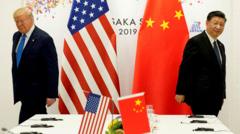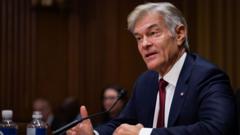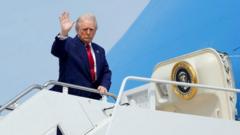This week, as Trump claimed April 2 would mark America's "liberation day," reactions from both the stock market and international partners may provide stark evidence that his bold measures are sparking serious political and economic turbulence.
Trump's Policies Hit Economic and Political Roadblocks

Trump's Policies Hit Economic and Political Roadblocks
Former President Donald Trump's recent announcement regarding significant tariffs on US imports was hailed as a transformative move. However, this ambitious economic agenda has encountered immediate backlash and challenges that could reshape his political trajectory.
Donald Trump's ambitious proposal to impose sweeping tariffs on US imports was heralded as a turning point in American economic policy. The response, however, has been far from triumphant. Following his announcement on April 2, the stock market experienced steep declines, signaling a negative reception not just from investors but also from key trading partners like Canada and the European Union, suggesting they are poised for retaliation.
In the wake of the tariff implementations, uncertainty has gripped the Trump administration, drawing parallels to the financial uncertainty of previous years. As officials prepared for anticipated protests against Trump, at least one major public event was postponed due to security threats. Meanwhile, the president's attempts to project confidence clashed with tangible market trends and voter sentiments.
Moreover, Trump's international agenda has also faced severe scrutiny, notably hindered by escalating conflicts in Gaza and Ukraine. Despite optimistic overtures about peace from his administration, developments have undermined these claims. Israel's renewed actions in Gaza have reportedly led to an increase in civilian casualties, while Russia's stance in Ukraine remains unyielding, casting doubt on Trump's assertions of progress.
Challenging court decisions have begun to obstruct Trump's immigration agenda, which previously enjoyed high levels of public support. Ongoing legal battles questioning the administration's deportation policies and refugee processes indicate a significant deviation from his intended objectives.
On the political front, recent electoral outcomes suggest troubling signs for Trump's party. Elections held in battleground states have seen Democratic candidates performing well, hinting at a potential shift in voter sentiment against Trump's policies, particularly his tariffs. Support within the Republican party appears tenuous, as several members express concern over potential fallout from heightened tariffs.
In a notable split, prominent Republicans have started to voice their opposition to Trump's tariffs, warning of potential job losses and market instability. Legal maneuvers aiming to limit the president's authority over trade are gathering momentum.
If the initial economic turmoil persists and affects public services, Republican allegiance to Trump may wane further. The current scenario raises questions about whether Trump's unyielding approach to his agenda might face serious reconsideration from within his party. As reality looms large over his declarations, Trump's sense of liberation may come with significant political and economic repercussions.





















